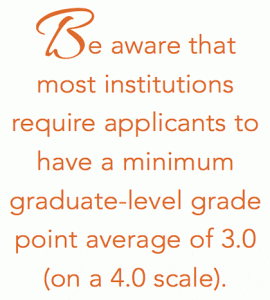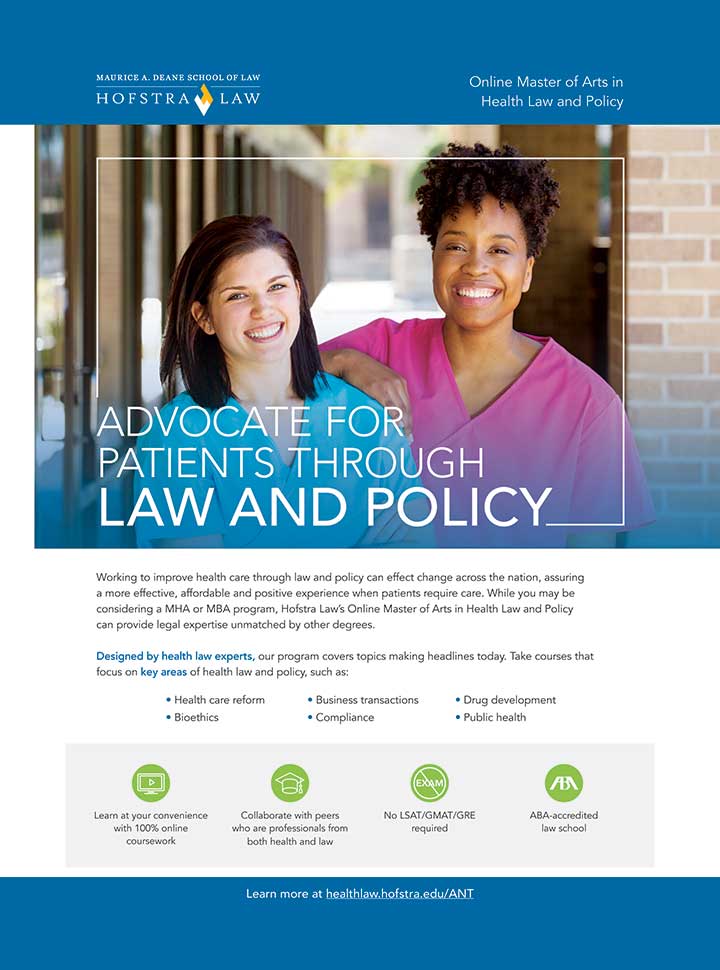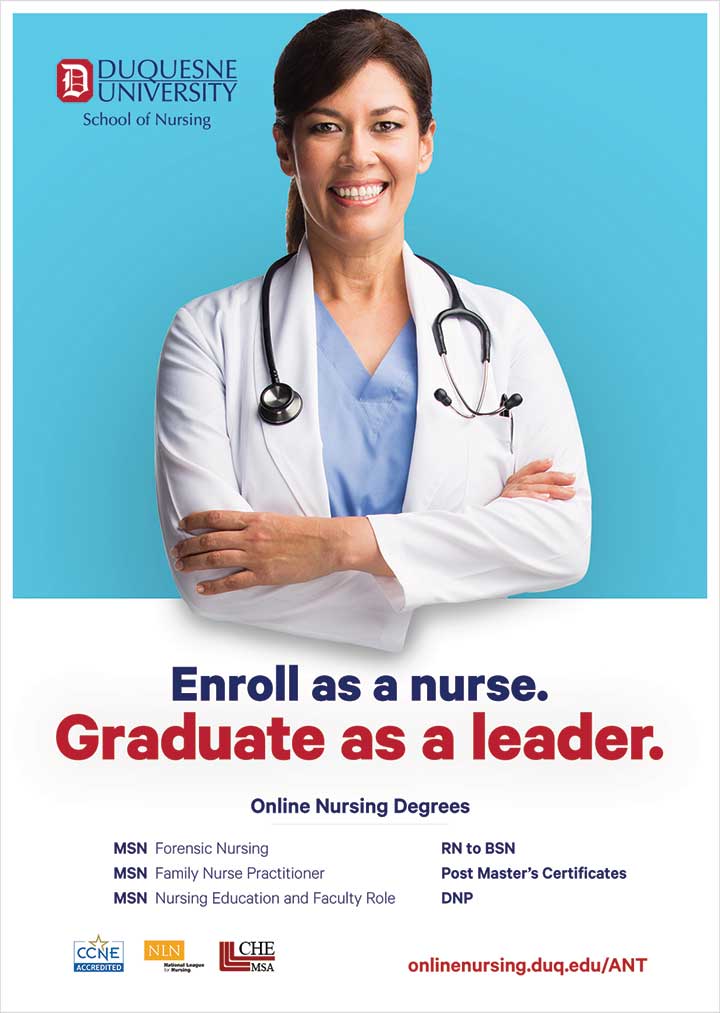It may be the key to opening the door to new opportunities.
By Meigan Robb, PhD, RN, and Teresa Shellenbarger, PhD, RN, CNE, ANEF
As a professional nurse, you know the importance of embracing lifelong learning and the value of furthering education to enhance your career opportunities. The Institute of Medicine’s 2010 report The Future of Nursing: Leading Change, Advancing Health suggests that to promote change and enhance population health, nurses must commit to advancing their knowledge and skills. One way to do this is to continue your education and seek a post-master’s certificate—an educational option for both clinically focused advanced practice registered nurses (APRNs) and nonclinically focused master’s–prepared nurses.
Nurses pursuing post-master’s certificates can continue their education in a new specialty or in a subspecialty of their current practice. Certificate programs are attractive because they build on previous academic success and leverage the nurse’s professional experiences.
But before embarking on further education, learn more about your options so you can make an informed decision about whether this educational track suits your needs.
If it does, choose a program that works for you. (See Types of post-master’s certificate programs.)
 |
|
Once you’ve determined that a post-master’s certificate program can help you reach your career goals, learn about the types of programs available. Internet searches are a good starting point, as are nursing program websites. In general, these programs offer specialty education and skills training either in clinical areas, such as gerontology, or in nonclinically focused areas, such as nursing education. • If you’re seeking advancement in a clinical field, consider pursuing one of the advanced practice RN (APRN) specialties—certified nurse practitioner, clinical nurse specialist, certified registered nurse anesthetist, and certified nurse-midwife. If you’re already an APRN, you might want to specialize by enrolling in a program with a specific population focus, such as adult gerontology acute care, pediatric primary care, or psychiatric mental health. • On the other hand, perhaps you want to explore a nonclinically focused certificate program that Be sure you understand the difference between a certificate program and certification. • Completing a post-master’s certificate program indicates you have successfully passed the • To become certified requires you to pass an exam offered through a professional credentialing Keep in mind that some, but not all, certificate programs prepare you to take certification exams to earn professional credentials. |
Is it the right path for you?
To determine if a post-master’s certificate program supports your professional growth, you’ll need to do some soul-searching. Make a list of your goals. Are you interested in changing your work focus and shifting away from your master’s preparation into a new area? If so, consider whether you want to leave the bedside, enter the academic setting, or move into a different clinical role, such as nursing informatics. Or do you want to expand your current work role but obtain additional education or specialization? In this case, think about which role you would like to transition to (for example, nurse executive) or which specialty population you would like to gain expertise in (for example, pediatrics).
Next, ask yourself:
- What new skills do I need to acquire to meet my goals?
- How will completing a certificate program help me meet my goals?
- What new professional skillset do I want to obtain from completing a certificate program?
- How will I be viewed professionally after completing this additional education?
- Have I established a work history that adequately prepares me for a certificate program?
- Do I have the time it takes to complete the additional education?
- Do I have the funds needed to complete it?
Your answers to these questions will help you identify the best certificate programs for you and choose among them.
Which program is the best fit?
Once you’ve decided on the area in which you want to pursue a certificate, explore specific program options. Consider such factors as program length, course delivery method, financial considerations, admission requirements, and application process. To gather information, visit the academic institution’s website or contact its program director. Also, ask professional contacts for their opinion on the programs you’re considering. They may have personal experience and be able to provide information that’s not widely available.
Program length
Certificate programs may vary in length depending on the student’s enrollment status (full- or part-time) and number of credits required. Total credits required can range from 9 to more than 42, with clinically focused certificate programs typically requiring a higher number of credits. Time to complete the program can vary from two consecutive semesters to more than 24 consecutive months.
Course delivery options
Courses in certificate programs may be delivered in a traditional classroom only, online only, or in a mixture of both (hybrid); in the latter, students attend some classroom sessions while also completing online coursework. Traditional classroom and hybrid methods may work well if the program is located near you.
Online programs, which offer greater accessibility and scheduling flexibility, are growing nationally. To determine which type of course delivery best suits you, consider your learning preferences and needs. If the online program isn’t based in your own state, verify that the institution is authorized to provide distance education in your state.
Also, find out if the program has residency or clinical practice requirements.
- Residency requirements could involve attending periodic onsite activities at the institution for program-related activities, such as workshops, skills lab activities, or evaluation sessions.
- Clinical practice requirements generally are associated with clinically focused certificate programs that require practice opportunities with an appropriately prepared preceptor in a healthcare organization.
Money matters
Can you afford to pursue a post-master’s certificate? Cost per credit can range from $300 to $1,400. Additional institutional fees or charges may increase overall program costs. If needed, look for ways to reduce your expenses by exploring available financial aid opportunities, including military discounts, corporate partnerships, scholarships, and tuition reimbursement from employers.
Admission requirements
 Review the admission requirements for the certificate programs you’re considering. Most require applicants to hold at least
Review the admission requirements for the certificate programs you’re considering. Most require applicants to hold at least
a master of science in nursing degree from an accredited institution. Also, your RN license must be current and unencumbered. And depending on the program’s focus, you may need to document your work experience in a particular clinical setting or for a specific number of years in the specialty area. Finally, be aware that most institutions require applicants to have a minimum graduate-level grade point average of 3.0 (on a 4.0 scale).
Application process
First, check the program’s application deadline. Some institutions use rolling admission, reviewing applications when they’re received and making admission decisions immediately. Others adhere to established yearly deadlines, reviewing all applications and making admission decisions all at once.
On the application, expect to provide information about your previous education, current and past employment experiences, and professional goals. Also, you’ll need to show proof of previous academic success and provide official copies of transcripts. Which transcripts you’ll be asked to provide vary by institution. Some institutions ask you to supply all previous educational transcripts; others ask only for transcripts associated with your highest nursing degree obtained.
For some programs, you may have to write an essay addressing a set of questions about your background, professional goals, or perceived ability to succeed in meeting the goals of the certificate program. In others, you may also need to submit professional references describing your professional traits. Or you may be asked to submit a professional portfolio indicating your experiences, accomplishments, and professional goals.
Advancing your goals
A post-master’s certificate program is a logical option for nurses interested in pursuing additional education. By carefully considering admission requirements, application process, program length, delivery method, and costs, you can identify which certificate program best aligns with your professional goals and personal circumstances.
Meigan Robb is an assistant professor of nursing at Chatham University in Pittsburgh, Pennsylvania. Teresa Shellenbarger is a professor of nursing at Indiana University of Pennsylvania in Indiana, Pennsylvania.
Selected references
Babson Study: Distance education enrollment growth continues. February 9, 2016. Online Learning Consortium. https://onlinelearningconsortium.org/news_item/babson-study-distance-education-enrollment-growth-continues-2/
Coswatte S. Understanding the State Authorization Reciprocity Agreement (SARA). May 27, 2014. Online Learning Consortium. https://onlinelearningconsortium.org/understanding-state-authorization-reciprocity-agreement-sara/
Institute of Medicine. The Future of Nursing: Leading Change, Advancing Health. Washington, DC: The National Academies Press; 2010.






















